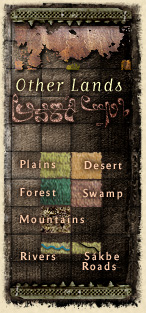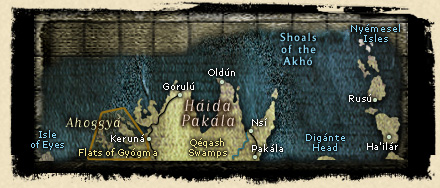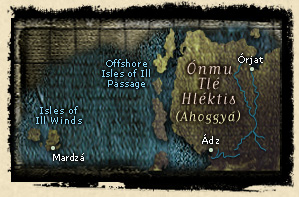 The Lands of Tékumel
The Lands of Tékumel
Other Eastern lands
The merchant princes of Háida Pakála, the gentle Nyémesel Isles and the Ayoggyá lands.
The king of Háida Pakála (Háida Pakálan: Híu) is recognised as the supreme suzerain, but in reality his power extends no further than the spears of his ruffians.
Each town has its own Híu with his own scruffy troops, and there is little sense of ‘nation’—the system is founded upon wealth and not always enlightened self-interest.
The nation’s merchants and sailors are known as ‘urban robbers’: sophisticated, decadent, unprincipled, avaricious and malicious.

 ónmu Tlé Hléktis is an autonomous state of Ahoggyá, a large and as yet unexplored region in the far southeast. For more information on the Ahoggyá, see their entry in the Nonhumans section.
ónmu Tlé Hléktis is an autonomous state of Ahoggyá, a large and as yet unexplored region in the far southeast. For more information on the Ahoggyá, see their entry in the Nonhumans section.
The Nyémesel Isles exhibit a theocracy reminiscent of Livyánu, though neither so complex or so secretive. A small standing army of commoners is maintained to repel pirates from Háida Pakála. The Ahoggyá of Salarvyá and Háida Pakála have no administration higher than the village level, though in ónmu Tlé Hléktis, there is a ‘king’ (called ‘The Loudest Grumbler’), though the details of his adminstration are vague.
Háida Pakála are of much the same racial type as Salarvyá, but the inhabitants of the Nyémesel Isles tend towards tallness (1.83 metres on the average, with females being 1.69 metres) and exaggerated slenderness. They suffer from premature baldness and have very little body hair. They are known as gentle and peaceful, committed to their Sea Goddess, and only violent when attecked.
The sailors and merchant princes of Háida Pakála raise obelisks to She Who Strides the Wind (a form of Avanthee-Dlamélish), and this same goddess is called Mrettén, the Goddess Who Walks Upon the Sea, in the Nyémesel Isles. The Ahoggyá are unique in that they seem to have no religion at all.
